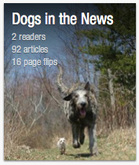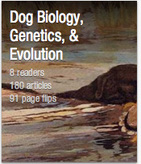Genes for skin disorder identified Humans and dogs are both affected by the allergic skin disease atopic dermatitis (AD), caused by an interaction between genetic and environmental factors. TheGerman shepherd dog (GSD) is a high-risk breed for canine AD (CAD), and they are also affected by low serum IgA levels. A Swedish cohort of GSDs was used to identify a the gene, plakophilin 2 (PKP2), known to be important for skin structure. The researchers also detected a division of the GSD breed into two subpopulations, where one is more prone to develop CAD and to have lower serum IgA levels compared with the other. (read more) (PLoS Genetics 2013: 9(5): e1003475) | DOGSLIFE: Taking a long view on dog health Dogslife is the first large-scale internet-based longitudinal study of canine health. The study has been designed to examine how environmental and genetic factors influence the health and development of a birth cohort of UK-based pedigree Labrador Retrievers. The study currently has 3538 dogs enrolled. (BMC Veterinary Research 2013: 9:13) |
Give that dog a cookie
Wolves are truly carnivores, but it turns out the dog's fondness for cookies might have played a role in domestication. Researchers comparing the genomes of wolves and 14 breeds of dogs have found that dogs have a surprising number of genes that have to do with processing carbohydrates. This might have allowed dogs to take advantage of grain-based food scraps discarded by humans and encouraged them to stick around. (listen to the podcast) (read more)
Wolves are truly carnivores, but it turns out the dog's fondness for cookies might have played a role in domestication. Researchers comparing the genomes of wolves and 14 breeds of dogs have found that dogs have a surprising number of genes that have to do with processing carbohydrates. This might have allowed dogs to take advantage of grain-based food scraps discarded by humans and encouraged them to stick around. (listen to the podcast) (read more)
 RSS Feed
RSS Feed





